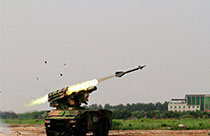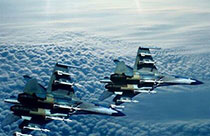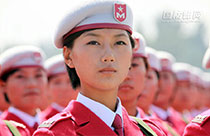

BEIJING, Sept. 2 -- China's military parade has captured the attention of foreign media. However, the brouhaha appears to ignore the true meaning of the event, which is, to borrow the British term, "Lest we forget."
The fact that the commemorative activities appear to have been appended to a seemingly-endless list that "proves" China to be a threat, hints that ideological shackles, suspicion and distrust of China remains in some parts of the international community.
This is a historic event. For the first time, service men and women from 18 countries will march past the heart of China, to celebrate a shared victory, and remember a part of Oriental history often ignored in the West.
For China, the parade is bittersweet, while celebrating victory it also serves to remind the nation of its past humiliation.
For the world, the parade serves as a reminder that mankind must unite for the sake of all those that died in war and for the future generations.
Misunderstanding about the military parade will likely linger, but China will still extend a genuine hand of peace and friendship to anyone who wishes to grasp it.
VICTIM, VICTOR
Perhaps one of the reasons China's military parade has been misinterpreted is that its role during WWII is often overlooked in Western narratives.
Time tells everything, but it may take as long as more than 70 years for truth to be understood.
Westerners learn from an early age that millions of Americans and Europeans died during WWII, but the fact that 35 million Chinese were killed or injured as Japan attempted to conquer Asia seems not to have been so widely promulgated.
The casualties of the Oriental battlefield, such as the savage Rape of Nanking in which 300,000 Chinese were killed, appear to be mostly ignored or, in some extreme cases, even denied.
What sort of world would we live in if people did not know about the atrocities at Auschwitz or world leaders openly denied the Holocaust?
After losing so much in WWII, is it any wonder that China wants to celebrate the victory, too?
The Chinese People's War of Resistance against Japanese Aggression started with the Sept. 18 Incident in 1931 and lasted until 1945. It was the longest fight against Fascist forces in history.
During WWII, over two thirds of Japan's ground forces were fought against in China.
The blood, sweat and tears of the nation held back Japanese troops, stopping them from attacking the eastern part of the Soviet Union, or making inroads into India, Australia and perhaps the Middle East.
POWER, PRIDE
Chinese history can shine a light on current politics.
The parade is not about China flexing its military muscle to scare other countries. It is about giving the Chinese people something to feel proud of.
It was China that invented gunpowder. However, these powders that brought joy to so many when they exploded in the air as fireworks also caused untold sorrow and brought humiliation upon the Chinese.
In the 100 years between the first Opium War in 1840 and the year that the People's Republic of China was founded, 1949, China's leaps toward modernization were disrupted by wars.
Between 1860 and 1900, when the Qing Dynasty was trying to westernize China's industry after the opium wars, invaders came. When China was struggling to shake off poverty and civil war in the 1930s, the invaders came again.
The memory of wars runs so deep in the mindset of the Chinese people that a military parade has become an important, and popular, way to boost national confidence and pride.
The united, disciplined goose steps of China's troops send a strong message to its people -- the country's war heroes did not die in vain, China will not be bullied again, and the dream of national rejuvenation is coming true.
If it strikes some as "overtly" assertive, this may be because the West still subconsciously expects China to remember its "place".
ORDER, HONOR
The purpose of commemorating war is to prevent it.
China has become a responsible actor in the post-world order, and is the largest contributor of peacekeepers among the five permanent members of the United Nations Security Council.
This parade is as much about the peace mission today as it is about those who fought in the past.
The parade is not a "stunt to taunt Japan". If the current leaders of China and Japan could stand together on the Tian'anmen Rostrum, it would make history. Regrettably, on this occasion, this will not come to pass.
China has extended invitations to its WWII allies as well as its former enemies. What else does a gesture such as this show aside from the sincere determination to safeguard a community of peace?
Seventy years ago, a united force achieved victory over evil. Despite this, war and fighting still occur. Let us take time tomorrow, on Sept. 3, to remember the heros, learn the lessons and ensure past mistakes will never be repeated.
In the name of peace, we must unite.
 'Enemy planes' intercepted by Hongqi-7B air-defense missiles
'Enemy planes' intercepted by Hongqi-7B air-defense missiles Blind date with bikini girls in Nanjing
Blind date with bikini girls in Nanjing Amazing photos of Chinese fighter jets
Amazing photos of Chinese fighter jets Chinese soldiers participate in training for V-Day parade
Chinese soldiers participate in training for V-Day parade Painting: Lonely women in Forbidden City
Painting: Lonely women in Forbidden City China and Russia hold joint drill in Sea of Japan
China and Russia hold joint drill in Sea of Japan 'Goddess' in Taiwan McDonald's
'Goddess' in Taiwan McDonald's Female soldiers at military parades
Female soldiers at military parades Photos of campus belle doing splits go viral
Photos of campus belle doing splits go viral Best blade forward
Best blade forward Infographic: Parsing China's massive V-day parade
Infographic: Parsing China's massive V-day parade Giant panda cub receives medical care in Guangzhou
Giant panda cub receives medical care in Guangzhou China celebrates 70th Anniversary of Victory of World Anti-Fascist War
China celebrates 70th Anniversary of Victory of World Anti-Fascist WarDay|Week